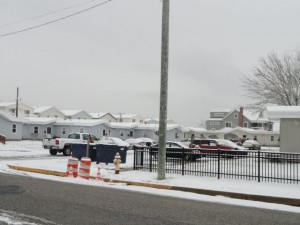The Ocean City Housing Authority has hired an outside company to plan and seek funding for what it hopes will be a complete rebuilding of its low-income housing units in Ocean City.
Pennrose, a Philadelphia-based property management company with experience in multifamily and mixed-income developments, is working on a plan that could redevelop the Peck’s Beach Village project near Fourth Street and West Avenue and add a second building to Bay View Manor at Sixth Street and West Avenue.

The Housing Authority envisions a project that would restore Haven Avenue as a through-street where it is now interrupted by Peck’s Beach Village and would include 122 newly constructed townhouse-style units, according to OCHA Executive Director Alesia Watson.
The Authority also wants to add 38 units to the senior housing at Bay View Manor in a new three- or four-story building that would be constructed on the building’s adjacent parking lot.

No specific plan for the proposed developments and no overall cost estimate exist yet, as Pennrose continues to seek funding and financing, Watson said.
Pennrose is working to secure a $6 million to $7 million federal Community Development Block Grant for housing authorities affected by Superstorm Sandy. Watson said Ocean City applied for the funding more than a year ago.
The company is also seeking competitive Low-Income Housing Tax Credits that encourage private investment in affordable housing.
_____
Sign up for free daily news updates from Ocean City.
_____
The Housing Authority also hopes to partner with the City of Ocean City and potentially use some of the $2.1 million in development fees that the city has been required to collect for affordable housing initiatives.
City Council voted on Dec. 18 to commit $1,470,000 to construction of affordable housing and $630,000 to affordability assistance. The resolution did not designate any specific project.
Municipalities throughout the state are required to “use it or lose it” when it comes to the collection of affordable housing assessments. But a constantly changing set of state Council on Affordable Housing (COAH) goals and guidelines frustrates many towns that try to act.
Ocean City Business Administrator Jim Mallon said the council resolution was not directly related to the Ocean City Housing Authority.
“We wanted to be on the record that we intend to use the money,” Mallon said.
Any effort to direct the $2.1 million to the Housing Authority would require council action and COAH approval.
But “a nice partnership” exists between the city and the Housing Authority, he said.
City Council in September 2014 approved a professional services contract with Mullin and Lonergan Associates for consulting services on community development programs, and the city is sharing that resource with the Housing Authority.
The Housing Authority is not run by the city. It is under the auspices of the federal Department of Housing and Urban Development (HUD).
The Authority currently administers 20 Peck’s Beach Village units on the north side of Fourth Street (between Simpson and West avenues) for senior citizens and 40 units on the south side of Fourth Street for families. The senior housing at Bay View Manor includes 61 units in a five-story building.
The units are rented to low-income residents at low rental rates — with preference given to veterans, the disabled and existing Ocean City residents, according to Watson.
The new units would continue to be rentals, she said, and the Housing Authority would work from a waiting list in choosing new tenants. But she said the new development could become a mixed-income project — with some units rented at fair-market rates.
She said OCHA looked at elevating the Peck’s Beach Village units, which sit on a flood-prone stretch of the island, and were substantially damaged in Superstorm Sandy. But the estimated cost was as high as $125,000 to $130,000 per unit, and the 60-year-old buildings could not necessarily withstand the process.
The new elevated units would include parking under the structures, and existing Peck’s Beach Village parking lots could be preserved and perhaps elevated, she said. Among the 20 senior units at Peck’s Beach Village, she estimated that five or six have cars, and she said about 16 of the 61 seniors at Bay View Manor drive.
Her vision includes the inclusion of businesses such as a hair salon or convenience store within the new community.
“We’re not going to just build houses. We’ll generate revenue and give jobs back to the community,” she said.
“Everybody keeps saying, ‘You know it’s going to be a challenge,’ ” Watson said.
But she said she believes construction could begin in 2016 and new low-income tenants could find homes in Ocean City in 2017. Construction would be completed in stages in a system that would eliminate the need to displace residents.
“Those units need to be updated, and they need to comply with new FEMA requirements,” Second Ward Councilman Antwan McClellan said. “It’s a great thing.”
All Peck’s Beach Village residents were displaced by the damage from Superstorm Sandy in October 2012, and the city committed $1.2 million to expedite repairs at the federal housing project and help residents return to their homes.
The action ultimately led to the resignation of three Ocean City Housing Authority members as they raised questions about the process and the idea of investing in repair of buildings that would have to be replaced.
The Housing Authority will try to recover whatever money it can by selling equipment from the renovated units, Watson said.
Pennrose is being compensated according a fee structure that gives the company a share of future developer fees. The structure allows the Housing Authority to pay no fees up front. A proposed funding schedule (subject to change depending on the final size and scope of projects) has Pennrose collecting $834,025 between 2016 and 2032 — with the bulk of it coming in 2016 and 2017.





